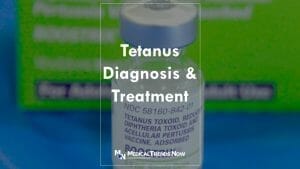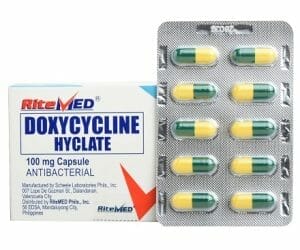Table of Contents
Tetanus is a potentially life-threatening illness caused by bacteria that can enter the body through an open wound. The Philippines is no stranger to this disease, and while it is preventable through vaccination, it must be treated if contracted. This article will explore various methods of diagnosis and treatment for tetanus in the Philippines, including vaccination, lockjaw, bacterial infection, and its impact on the central nervous system.
What is Tetanus?
Tetanus is a bacterial infection that affects the nervous system and can cause serious health complications, which are found in soil, dust, and animal feces.
The bacteria, Clostridium tetani, enters the body through cuts or puncture wounds in the skin, such as those caused by stepping on a rusty nail or other sharp objects, and releases toxins that cause severe muscle spasms, seizures, and death.
Animal bites can also introduce bacteria into the wound.
Tetanus can be life-threatening if left untreated, but it’s preventable with proper immunization.
In addition to cuts and punctures, another cause of tetanus is surgery or other medical procedures that are done without proper sterilization techniques.

Causes of Tetanus in the Philippines
Tetanus is a serious medical condition that can lead to fatal consequences if left untreated. The disease is caused by bacteria known as Clostridium tetani, which enters the body through deep puncture wounds or cuts in the skin. Once inside the body, these bacteria produce toxins that affect the nervous system and cause painful muscle spasms. Understanding what causes this serious illness can help individuals identify how to protect themselves from getting it in the first place.
One of the main causes of tetanus is coming into contact with soil or other items contaminated with feces from infected animals such as horses, sheep, and cattle. Any type of wound that comes in contact with this contaminated material can be at risk of tetanus. Likewise, not properly cleaning and disinfecting any wound can create an environment where C. tetani may thrive and cause infection.
![Amoxicillin 500mg Capsule [PRESCRIPTION REQUIRED] - Watsons Pharmacy](https://e52hyu4yuyt.exactdn.com/wp-content/uploads/2022/10/WATSONS-Amoxicillin-500mg-Capsule-PRESCRIPTION-REQUIRED-Watsons-Pharmacy-300x300.webp?strip=all&lossy=1&ssl=1)
Symptoms of Tetanus Among Filipinos
Tetanus is an infection caused by a bacteria known as Clostridium tetani, which enters the body through wounds. It is highly contagious and can be fatal if not treated properly. Symptoms of tetanus usually begin to show up anywhere from three to twenty-one days after initial exposure to the bacteria. Early signs of this condition include muscle spasms in the jaw and neck, difficulty swallowing, fever, and headache.
As the infection progresses, Filipinos may experience intense muscle spasms throughout their bodies that can cause seizures and respiratory failure. Other common symptoms of tetanus include high blood pressure, sweating, heart palpitations, fever, and increased sensitivity to light. In severe tetanus cases, complications such as pneumonia or sepsis may occur due to weakened muscles or the inability to clear lung secretions.
Diagnosis of Tetanus in the Philippines
Doctors in the Philippines may diagnose tetanus by asking about recent injuries, scrapes, punctures, and trauma and looking into whether or not someone shows particular symptoms. No hospital lab tests can establish whether or not tetanus is present.
In the Philippines, diagnosis of tetanus can be difficult due to a lack of resources for prompt tetanus treatment.
Early diagnosis is key to properly treating this condition before it leads to further complications or death. Tetanus symptoms include muscle spasms, fever, sweating and headache; if any of these are present, medical attention should be sought immediately. Doctors in the Philippines may use blood tests or culture tests to determine if tetanus is present in a patient’s body and evaluate their overall health status.
![AUGMENTIN Co-Amoxiclav 1gm antibiotic Tablet [PRESCRIPTION REQUIRED] - Watsons Pharmacy](https://e52hyu4yuyt.exactdn.com/wp-content/uploads/2022/10/AUGMENTIN-Co-Amoxiclav-1gm-antibiotic-Tablet-PRESCRIPTION-REQUIRED-Watsons-Pharmacy-300x292.jpg?strip=all&lossy=1&ssl=1)
Treatment for Tetanus
Tetanus is a serious health concern in many parts of the world, and it is no different in the Philippines. The disease can cause muscle spasms, difficulty and pain when swallowing, stiffness throughout the body, and fatal respiratory problems. Knowing that tetanus can be deadly if left untreated, it’s critical to understand how this infectious disease is treated in the Philippines.
One of the first steps taken when treating tetanus is to administer antibiotics such as penicillin or metronidazole through injection or intravenous (IV) infusion to prevent any further spread of the bacteria that causes it. This helps reduce the severity of symptoms and can even prevent complications such as respiratory failure. Additionally, muscle spasms can be relieved with medications like benzodiazepines and anti-convulsants, which help control muscle contractions for better comfort and mobility.
Aside from the usual medical protocols, tetanus is treated with support such as wound care. Wound care and closure can also be used to help prevent further infection and promote healing. This includes cleaning the wound regularly, applying topical medications such as ointments or creams to reduce inflammation, and using dressings to keep it covered while it heals. Additionally, pain relief medicines may be prescribed if needed. Surgical procedures are typically performed to remove contaminated objects in the wound and clean it thoroughly.

Prevention of Tetanus for Filipinos
Here are some of the preventions that Filipinos can do:
Vaccines
The Philippines Department of Health recommends that adults receive at least three doses of the diphtheria-tetanus (DTP) vaccine as part of their routine immunization schedule. Immunization is one of the most effective ways to protect against tetanus; it is estimated that almost 95% of adults have been inoculated against it. These vaccines protect against diphtheria and tetanus and provide long-term protection against both diseases. The DTP vaccine is given to children as early as six weeks old, with booster shots given every 10 years thereafter to maintain immunity throughout adulthood. If a person does contract tetanus despite these vaccinations, medical professionals may prescribe antibiotics to help fight off any existing bacteria causing complications from the infection. However, the disease is often fatal without proper care, especially if wounds have become infected. Wounds must be cleaned and disinfected with antibiotics, and the patient needs to be monitored closely for signs of trouble.

Hygiene
In the Philippines, tetanus is still a major public health concern. Poor hygiene habits, such as not washing hands with soap after using the toilet or before handling food, have been identified as one of the biggest risk factors for contracting this infection. In addition, inadequate vaccination coverage has resulted in many children and adults being vulnerable to this potentially fatal condition.
The Philippine Department of Health is currently undertaking initiatives to raise awareness of proper hygiene practices and increase access to safe and effective vaccines against tetanus amongst those at greatest risk of infection.

When and where to seek help for Tetanus
The best place for potential Filipino patients with tetanus to seek medical care is their local doctors in the Philippines or emergency room. Medical professionals will assess the situation and provide direction on how best to treat the wound, depending on the severity and risk of exposure. In some cases, antibiotics are enough, while more severe reported cases of tetanus require treatment in a hospital, where medical staff can monitor symptoms and administer medications like antitoxin or sedatives if necessary.
To prevent the risk of infection, it is important to clean the wound thoroughly with soap and water and apply a sterile dressing. The CDC recommends against using hydrogen peroxide or iodine, as these can cause further tissue damage.

FAQs
Here are some of the frequently asked questions about treatment for tetanus:
What are the signs and symptoms of tetanus?
Tetanus is a serious and potentially life-threatening infection caused by the bacterium Clostridium tetani. It affects the nervous system, causing extreme muscle spasms that can be severe enough to break bones. Symptoms of tetanus usually occur within four weeks of contact with the bacteria, but in some cases, they can appear as late as eight weeks later. In the Philippines, treatment for tetanus includes antibiotics and proper wound care to prevent further infection.
The primary signs and symptoms of tetanus include stiffness in the jaw muscles (called lockjaw), difficulty swallowing due to throat spasms, headache, fever, sweating, changes in blood pressure or heart rate, and painful muscle spasms throughout the body. These muscle spasms are often so severe that they cause fractures or dislocations of joints or vertebrae in severe cases.

What kind of prevention of tetanus can doctors do?
Prevention of tetanus is an important step in avoiding the spread of this potentially fatal infection. Doctors in the Philippines can take numerous steps to prevent tetanus and reduce the risk of it being contracted by their patients. In the Philippines, vaccination is one of the best ways to prevent tetanus.
Vaccination against tetanus, also known as Diphtheria Tetanus (DT) or DTaP, is recommended for all children in the Philippines from birth until they are six years old by the Philippine Department of Health. The vaccine works by introducing a small number of weakened bacteria into your body, stimulating an immune response without causing you to become infected with tetanus. Receiving these vaccinations can produce immunity that can last for up to 10 years or longer if booster shots are given at regular intervals throughout adulthood.

What are the complications of tetanus?
Tetanus is a serious and potentially fatal medical condition that is caused by the bacterium Clostridium tetani. This bacteria can enter the body through an open wound or cut, resulting in muscle spasms and stiffness, particularly in the jaw area. Despite advances in modern medicine, treatment for tetanus remains largely supportive care, with antibiotics used to prevent secondary infections. In some cases, further medical interventions may be necessary to alleviate complications associated with this illness.
In the Philippines, those suffering from tetanus may require intensive care and monitoring at a hospital due to its potential for complications such as respiratory failure or problems related to high blood pressure. Furthermore, Filipino patients may need additional treatments such as nerve blocks and sedatives if they experience severe muscle spasms or intense pain due to the infection.

How is tetanus diagnosed in the Philippines?
Tetanus is a serious, potentially life-threatening bacterial infection affecting muscles and nerves. The disease is caused by the bacterium Clostridium tetani and can be contracted through contact with contaminated objects, soil, or animal feces. The diagnosis of tetanus can be difficult due to its wide range of symptoms. In the above, we have discussed how tetanus is diagnosed and given an overview of treatment options in the Philippines.
The primary symptom of tetanus is not able to control muscle spasms and stiffness in various body parts. A doctor may also look for signs such as difficulty swallowing, high fever, sweating, rapid heart rate, and constipation. To confirm the diagnosis of suspected cases of tetanus infection, Filipino doctors often use imaging tests such as X-rays or CT scans to help identify any bacteria present in the patient’s body. Other laboratory tests may be used, including blood tests, to detect the presence of bacteria or other pathogens in the body. If you are in the Philippines and have symptoms of tetanus, contact your local healthcare provider as soon as possible.

What is lockjaw in tetanus?
Lockjaw, more medically referred to as trismus, is one of the tetanus’s most common and characteristic symptoms. Tetanus is a serious infection caused by bacteria that are found in soil, dust, or animal feces. It can be acquired if the skin gets cut or punctured by a rusty object or contaminated area.
The primary symptom of lockjaw is an inability to open the mouth completely due to spasms in the jaw muscles, which gives it its colloquial name, ‘lockjaw.’ This could also lead to difficulty talking, chewing, and swallowing. Treatments for tetanus in the Philippines include antibiotics such as penicillin G and metronidazole, along with wound care and good hygiene practices such as washing wounds promptly with soap and water.

Is the tetanus vaccination lifetime?
Tetanus is a serious infection caused by bacteria that can lead to paralysis, breathing problems, and even death. It is most commonly spread through contact with an object or material infected with tetanus spores. In the Philippines, the prevention of tetanus through vaccination has been implemented in an effort to stop the spread of this potentially deadly disease. As such, many are asking if the tetanus vaccine is lifetime protection.
In general, it is recommended that adults have a booster shot every ten years. To ensure lasting immunity against tetanus, individuals should receive boosters throughout their lifetime as part of routine health care maintenance. It is especially important for those who are at risk of developing a severe case of tetanus due to frequent exposure to objects or materials contaminated with the bacteria.

How to treat wound care from tetanus?
Tetanus is a serious infection caused by the bacterium Clostridium tetani, which often results in wound care. In recent years, the Philippines has seen a significant rise in cases of tetanus due to a lack of vaccination, poor hygiene practices, and inadequate healthcare infrastructure. It is, therefore, essential that individuals know how to treat wounds contaminated with this bacteria effectively.
The most important step for treating tetanus is preventing infection through proper wound care and sanitation. This includes cleaning the wound with soap and water, applying an antiseptic cream or solution, covering it with a dry dressing, and seeking medical attention as soon as possible after exposure to the bacterium. Vaccination against tetanus can also help prevent infection if administered promptly following contamination or injury.
Is the treatment of tetanus painful?
Tetanus is an infectious disease caused by the bacteria Clostridium tetani, found in soil, dust, and manure. It is a serious health problem in the Philippines, which has seen thousands of cases each year between 2008 and 2018. Many Filipinos are left to wonder: Is the treatment for tetanus painful?
The answer to this question depends on the severity of the infection. Generally speaking, mild cases may not require any medical intervention at all, as they may be treated with antibiotics alone. However, more severe cases may require additional treatments such as surgery or immunization with a tetanus toxoid vaccine. These treatments can be uncomfortable for some individuals but rarely cause pain.
How can you get tetanus?
Tetanus is a potentially life-threatening medical condition that can be caused by a bacterial infection. It is highly recommended to receive the tetanus vaccine to prevent its occurrence. However, it is still possible to contract this infectious disease even if you have received the proper immunization. In the Philippines, treatment for tetanus is available and should be sought out immediately if symptoms occur.
Tetanus is caused by bacteria named Clostridium Tetani, which enter into an individual’s body through open wounds or cuts on their skin. The bacteria produce toxins in the bloodstream, which can cause severe muscle spasms and stiffness throughout your body, as well as difficulty breathing and swallowing food or liquid. Symptoms usually start within 3-14 days after exposure to the bacteria but can sometimes take up to several weeks before they appear.
Who is at risk of getting tetanus?
Tetanus usually affects Filipinos who have not been immunized against the infection, but anyone can be at risk of getting it if they are exposed to the bacteria.
- Those most at risk for tetanus are Filipinos who were never vaccinated or whose vaccinations may have expired
- Those with deep wounds from contaminated objects
- Individuals with poor wound care practices; and those who work in agricultural or construction settings where they’re more likely to come into contact with contaminated objects.
- Filipinos who live in tropical climates are also more susceptible because of hotter temperatures which allow spores to multiply faster.
How soon after infection do tetanus symptoms occur?
Tetanus is a serious infectious disease caused by Clostridium tetani bacteria. This bacteria produces toxins that can cause muscle stiffness and spasms, leading to severe illness and even death in some cases. So, it is important to understand how soon after infection, tetanus symptoms occur.
The time between exposure to the bacteria and when symptoms start varies from person to person but generally appears within 3-21 days following infection. For instance, if the wound has been contaminated with dirt or feces containing this particular bacteria, then signs of tetanus may appear as early as 24 hours later. The early signs of the disease include difficulty swallowing or jaw cramping, followed by neck and abdominal muscle stiffness within several days of infection. If left untreated, these symptoms may worsen over time and lead to a life-threatening situation.
Does past infection with tetanus protect against further infections?
Tetanus (also named lockjaw), is a deadly bacterial infection caused by the Clostridium tetani bacterium. It is highly unlikely for an individual to contract tetanus twice; however, Does past infection with this disease provide total protection from tetanus and further infections?
According to research by the Centers for Disease Control and Prevention (CDC), individuals who have previously been infected with tetanus will develop immunity that lasts up to 10 years. In some cases, a booster shot may be necessary if it has been more than ten years since the initial infection. Additionally, the CDC recommends that adults receive regular vaccinations against tetanus every ten years or so to maintain their immunity levels even after the initial infection.
What are the complications associated with tetanus?
The most serious complication from tetanus is respiratory failure due to paralysis of the diaphragm muscle, which makes breathing difficult or impossible. Other complications include high blood pressure, irregular heartbeat, seizures, and coma. When left untreated for long periods, tetanus can sometimes lead to death due to its debilitating effects on a person’s breathing capabilities. Other complications include broken bones due to violent spasms and high fever, which could lead to organ failure or shock.
Additionally, Filipinos who suffer from tetanus may experience sleeplessness due to muscle contractions that are difficult for them to control and cause extreme discomfort.
How long is the effectiveness of the tetanus vaccine in the Philippines?
Tetanus is a major health concern in the Philippines, as it can lead to serious complications and even death. The good news is that this life-threatening illness can be prevented by getting vaccinated. But how long does the tetanus vaccine remain effective in protecting you against the disease?
According to the World Health Organization (WHO), one dose of tetanus toxoid is considered sufficient for immunization to protect individuals from tetanus for at least ten years. A second dose of booster shot is usually recommended every ten years or when necessary, such as after an injury or wound that may have been exposed to dirt or other foreign objects. In addition, adults should also get a booster shot every ten years if they haven’t had any previous vaccinations or boosters within five years.
Therefore, regular vaccination and booster shots prevent tetanus infection in the Philippines. The vaccine is part of the Expanded Program on Immunization (EPI), which is a global immunization program that aims to protect every child against preventable diseases.
How long can you recover from a tetanus infection?
Tetanus is an infection caused by bacteria found in soil and animal feces. It can cause severe muscle spasms and even death if not treated properly. The good news is that it can be prevented with a vaccination, but how long does it take to recover from the infection?
Recovery time varies depending on the severity of the infection and any other underlying health issues that may complicate healing. Generally speaking, most Filipinos with tetanus will begin to recover within two weeks of being treated with antibiotics and antitoxin medications. While some individuals may experience full recovery in this time frame, others may require additional medical interventions to ensure their muscles return to normal functioning. For more serious cases of tetanus, the recovery could take much longer due to prolonged hospitalization and intensive care.
Which type of doctor can treat tetanus?
Tetanus is a serious bacterial infection that affects the muscles and nervous system. It can cause painful muscle spasms and can even be fatal if not treated properly. In the Philippines, its treatment is best done by an experienced doctor in the practice of infectious diseases.
The ideal medical professional for treating tetanus is an infectious disease specialist or physician. An infectious disease specialist has years of experience recognizing and managing infections caused by viruses, bacteria, fungi, and parasites. In addition to this training in diagnosing and treating illnesses like tetanus, they may also have expertise in preventive measures such as vaccinations.
In the Philippines, patients with tetanus should find a doctor that has been trained in both conventional medicines as well as traditional methods of healing, such as herbal medicine usage.
Conclusion: Treatment for Tetanus in the Philippines
In conclusion, tetanus is extremely serious and can devastate a person’s health. Early diagnosis and treatment are key to managing the disease and preventing further complications. The Philippines has made great strides in providing resources to help Filipinos access the necessary treatments for tetanus, such as antiserum, wound care, antibiotics, and oxygen therapy. Public health campaigns also educate Filipinos on preventing tetanus through vaccinations and proper wound care.
Sources: Treatment for Tetanus in the Philippines
- Tetanus Immune Globulin (Intramuscular Route) – Mayo Clinic
- Vaccine Information Statement | Td | Tetanus and Diphtheria | VIS CDC
- Neonatal Tetanus – Apollo Hospitals
- Tetanus Toxin – an overview | ScienceDirect Topics
- Are you vaccinated against tetanus? Do I need a tetanus vaccine after an accident or injury? – NHS
- What happens if you develop tetanus? Tetanus Disease (also known as Lockjaw) – CDC
- Tetanus is a medical emergency requiring: Evaluation and care in the hospital. CDC
- HUMAN TETANUS IMMUNOGLOBULIN (HTIG) – Medical Guidelines MSF
- Tetanus bacteria – World Health Organization (WHO)
- The use of tetanus toxoid StatPearls – NCBI Bookshelf
- Whole-Cell and Acellular Pertussis Vaccine – Karger Publishers
- Tetanus Booster Shot: Purpose, How Long It’s Effective & Boosters – Cleveland Clinic
- Tetanus Antitoxin (ATS) – Serum Institute of India
- Human Tetanus Immunoglobulin – (emc) Medicines UK
- Tetanus incubation period – CDC
- Diphtheria and Tetanus Toxoids – NCBI Bookshelf – NCBI
- Tetanus and diphtheria toxoid vaccination in adults – UpToDate
- History of tetanus – History of Vaccines
- Use of Tetanus Toxoid, Reduced Diphtheria Toxoid – PubMed
Disclaimer
This website is intended to educate both members of the general public and those working in the medical field on the prevalence, causes, and methods for preventing, diagnosing and treating diseases that affect people throughout their lives. This website’s content is provided solely for informational reasons and is not meant to serve as a substitute for the advice of a qualified medical practitioner.













